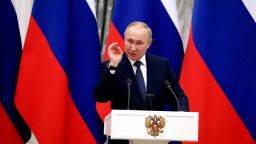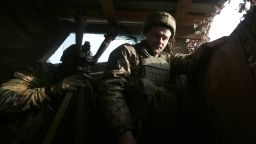Speaking to CNN, Ukrainian President Volodymyr Zelensky said that “any provocations are very dangerous” when asked about a potential false flag pretext for war with Russia.
“I think the most complicated question is that in Crimea, in the temporary occupied territory of the Donbas along Ukraine and Russia, there is 30-35,000 on the temporary occupying territories … so provocations are, indeed, very dangerous, if you have this number of troops. One shelling, one cannon fire can lead to war,” Zelensky warned.
“This is what our partners believe, I mean the partners that are around us that have joined borders with us, we know the history of the Soviet Union and they do understand the kind of risks we are facing,” he added. “Poland, the Baltic states, Lithuania and Estonia, Latvia, Moldova, they know what that could lead to. So, we need to be very careful.”
The Ukrainian president went on to say casualties between Ukraine and Russia were more significant in 2014 but admitted that current tensions are “horrible,” adding that “it’s a tragedy for our nation, for our people.”
“This is the tragedy for Russians as well who used to have good relations with Ukraine,” he added.
Some context: The latest US intelligence assessment indicates that Russia is continuing with preparations to invade Ukraine, according to a senior US official with direct knowledge and another source directly familiar with the intelligence.
The assessment — described as “bleak” by the senior official — indicates Russia could attack in the coming days. The US still expects any Russian invasion to be prefaced by a false flag operation, another US official said.
Secretary of State Antony Blinken, speaking at the Munich Security Conference on Friday, pointed to recent actions — including Russia adding “leading edge forces” to its troops on Ukraine’s border — to show how Russia’s coercive tactics towards Ukraine are already in play.
“Everything that we’re seeing, including what you’ve described in the last 24, 48 hours is part of a scenarios that is already in play of creating false provocations, of then having to respond to those provocations, and ultimately committing new aggression against Ukraine,” Blinken said.
Russia has created pressure points on three sides of Ukraine — in Crimea to the south, on the Russian side of the two countries’ border and in Belarus to the north.
Some history: In early 2014, mass protests in the capital Kyiv known as Euromaidan forced out a Russia-friendly president after he refused to sign a European Union association agreement.
Russia responded by annexing the Ukrainian peninsula of Crimea and fomenting a separatist rebellion in Ukraine’s east, which seized control of part of the Donbas region. Despite a ceasefire agreement in 2015, the two sides have not seen a stable peace, and the front line has barely moved since.
Nearly 14,000 people have died in the conflict, and there are 1.5 million people internally displaced in Ukraine, according to the Ukrainian government.
CNN’s Jim Sciutto, Natasha Bertrand and Eliza Mackintosh contributed reporting to this post.















